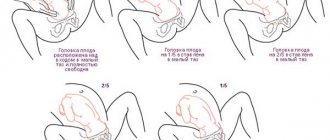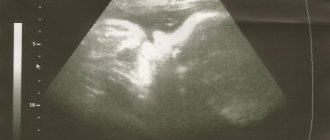Home / Preparing for childbirth / Week 39: the stomach turns to stone, which means you’ll be heading to the hospital soon
71327
1
Many expectant mothers have a hard stomach at 39 weeks. Why does this happen? Some women think that labor is already beginning, others worry that something bad is happening to the baby. The answer in most situations is simple - these are training contractions.
At one point, the stomach turns to stone, becomes hard, a tight ring seems to surround the lower back. During pregnancy at 40 weeks, this can happen several times a day, so many first-time mothers get scared and don’t know what it is and when to go to the doctor.
What does it feel like when contractions start?
Contractions are called contractions because they cause a feeling of grasping, sharp compression. When it comes to the upcoming birth, cramping sensations naturally occur in the hip joints.
In fact, contractions are a very complex “biochemical process”, since they involve the baby’s pituitary gland and the placenta itself, which begin to produce special substances, which in turn contribute to the opening of the cervix, which is accompanied by contractions.
During contractions, the uterus contracts, its muscle fibers thicken and shorten, which helps open the cervix to the extent that the baby's head can squeeze through it. Full dilatation is recorded when the cervix is dilated by 12 cm, and the intrauterine pressure also increases, as a result of which the amniotic sac ruptures and the amniotic fluid drains.
Nutrition during childbirth
The birth process does not proceed quickly. In women who have already given birth, they usually last 5-7 hours; in first-born women they last for 9-11 hours. During this time, a woman needs to eat something to replenish her strength, but her diet is sharply limited by the possibility of emergency surgery.
During childbirth, the possibility of nutrition depends on the condition of the woman in labor, the course and plan of labor. Some women can eat during childbirth, while others are strictly prohibited. If your neighbor is allowed to have a snack, you should not decide on your food on your own. It is necessary to consult a doctor.
Useful tips:
- You should not go to the maternity hospital with an empty stomach. It is worth replenishing your energy reserves when labor begins. However, it is not recommended to gorge yourself on potatoes and cutlets. You can snack on soft cottage cheese, yogurt, bread with cheese, drink jelly, compote or sweet tea.
- If you feel thirsty, you should drink fruit juice or water. If eating is impossible due to nausea, you can suck on a piece of ice or rinse your mouth with cold water.
- When contractions intensify and become more frequent, you should abstain from eating, although few women experience hunger with such sensations. Quite often, when the uterus contracts, nausea occurs and vomiting can be triggered by even a tiny piece of chocolate.
- When pushing begins, it is forbidden to drink water or eat food. But the good news is that the second stage of labor is short and you will give birth within 30 minutes.
- After childbirth, you need to restore lost strength. However, it is not advisable to eat anything right away. You can drink some water, and after 1-2 hours eat something light, for example, vegetable broth, yogurt, fruit puree.
How to know if contractions have started
When can a pregnant woman expect contractions? We have all heard about the threat of premature birth, which also begins with contractions, but along with these signs of impending labor, the woman also experiences other symptoms. In any case, cramping pain requires special attention from the expectant mother. Practice shows that the contractions themselves and the sensations during them are different for all women. Even false contractions, which doctors love to talk about, are not noticed by all pregnant women. Moreover, the expectant mother can only find out about real labor pains when she has the desire to push. We have also heard about rapid labor, when contractions can no longer be confused with anything.
Ideally, everything happens something like this: starting from the 20th week of pregnancy, the body begins to “rehearse” the upcoming birth by contracting the muscles of the uterus. The woman feels that something is wrong with the uterus: it turns to stone and relaxes with chaotic frequency. So, a woman can “grab” for a whole minute, then the pain subsides and disappears without a trace, and soon resumes, but the regularity of such contractions cannot be noted. We are talking about false contractions - harbingers of the upcoming birth. But not all women experience this condition, and their labor begins on time with real contractions.
How to recognize them? Again, ideally, the first contractions go unnoticed by the woman, except that very little discomfort is felt in the abdomen or lower back, and a strong premonition that childbirth is about to take place (it’s difficult for women’s intuition to find an explanation, but almost every woman subconsciously knows : it's time!).
Gradually, the second, active, phase of contractions begins, when they occur at a precise interval, which is shortened all the time: cramping attacks are repeated more and more often, last longer, not only the frequency and duration increases, but also the degree of pain. This goes on until one contraction lasts more than two minutes, and the second occurs after 60 seconds. At this time, you should already be in the maternity hospital, because in 30-40 minutes the birth itself will begin. The last stage of contractions is the most painful, as the woman has an overwhelming feeling of going big. But if the uterus is not open, she will have to hold back her efforts so as not to harm herself and the baby.
More on the topic
How to recognize contractions during the first birth
Contractions before childbirth
False contractions during pregnancy
Training contractions
Contractions: when to go to the maternity hospital?
Why does my stomach turn to stone?
As a rule, unusual sensations in the abdomen appear when a woman is about to give birth. This is the main sign indicating the imminent birth of a baby, especially if the stomach becomes stiff and hurts at 40 weeks of pregnancy.
It should be noted that not only at the 39th and 40th week of pregnancy the belly becomes stone - this can happen at any period of gestation. Why is this happening?
There are several reasons:
- Hypertonicity . The uterus consists of smooth muscle fibers, which tend to contract, resulting in a feeling of tension in the abdomen. This condition can occur due to overwork, stress, and sometimes women indicate that hypertonicity occurs after an obstetric examination.
- Braxton Hicks contractions . When an expectant mother is expecting her first child, she may be frightened if her stomach turns to stone at 40 weeks of pregnancy and it is not clear what it is. Training contractions prepare the uterus and the entire body for a complex and lengthy process.
A pregnant woman at the end of the last trimester needs to listen to the signals that her body gives. If the lower abdomen is tight and turns to stone at 40 weeks, you need to note the beginning and end of contractions, as well as the duration of the intervals between them. If pain appears every 10 minutes, you need to urgently go to the maternity hospital.
What to do if contractions start
When the first contractions begin, you should stop any activities and try to rest. Many people find it helpful to walk around the room; others sit down and stand up. As soon as the contractions intensify and begin to repeat more often, immediately go to the maternity hospital. Particularly suspicious people may go to the hospital earlier.
Don't worry about anything: the doctor delivering the baby knows exactly what to do and when. If it’s too early to push, he will certainly notify you about it.
The main thing now is to relax as much as possible. No matter how paradoxical it may sound, try to let go of all worries and fears. Panic will not lead to anything good, and, strictly speaking, there is nothing to be afraid of. The birth you've been waiting for so long begins. There are only a few hours left before meeting the baby. Whether you can help him overcome the difficult path into this world now depends on you. Breathe evenly and deeply, trying to relax and “let go” of the pain. Excessive tension in the muscles will increase pain, and therefore it is important to relax them as much as possible now.
Listen to your body, remember breathing techniques during childbirth - use them as different periods of the birth process occur. Shallow “dog” breathing will help restore strength and not harm the child between attempts. At the doctor’s command, smoothly take a full breath of air so that in the next minute you can push productively.
Think about the baby, you just have to calm down, tune in to a productive birth and listen carefully to the instructions of the medical staff.
The most important point
While waiting for labor to occur, you need to remain calm. You shouldn’t get irritated by little things or get nervous. You must always be in a good mood. A pregnant woman is recommended to practice proper breathing and relaxation techniques during labor. Mom’s body had been preparing for this moment for a long time. And now he comes. After the onset of real contractions, you need to act without haste and panic according to a pre-prepared plan.
You were able to do a lot of difficult work and go through a difficult path. As a reward, nature gives the baby.
Is the pain during contractions terrible?
So we ourselves scared you by describing the “most painful” last stage of labor. I myself was waiting for it and was afraid of it more than the birth itself, but I was never able to understand why women in labor were crying and screaming so much, because it turned out that the pain was tolerable, moreover, even pleasant. You may not believe it, but the pain during contractions was quenched by the thought that this is how a little man, my little blood, is born.
It turns out that my feelings were scientifically confirmed. In fact, labor pain is not hidden in the uterus, since its contraction is a natural process, which means that pain receptors (and there are very few of them in the muscles of the uterus) do not give a signal to the brain about any violations (the meaning of any pain is precisely consists in “notifying” the body of “problems”). But the real feeling of pain arises in the muscles that surround the uterus, and in order to overcome it, it is only important to learn to control their relaxation, since muscle tension interferes with the normal physiological course of labor. Moreover, fear, anxiety and worry aggravate muscle tension. Hence the simple conclusion: a pregnant woman who is afraid of childbirth experiences great pain from the first contractions. But many women do not even know what labor pain and pain during contractions are, so learn to properly tune yourself to the inevitable process - childbirth, namely, know how to relax; do not waste your energy, as you will need it during the period of expulsion of the fetus; talk to your baby; don’t try to overcome the pain, but simply take it for granted.
I think that if you consciously prepare for the process of childbirth, then you will not need information about epidurals, nitrous oxide with oxygen, promedol and other ways to relieve pain from contractions and childbirth.
Necessary examinations
At week 39, you should visit an observing gynecologist at the antenatal clinic. Now this is more important than ever, since only a doctor can determine whether everything is fine with the baby and whether there is a reason for hospitalization in the maternity hospital.
During this visit, the doctor will do the following:
- Ask about your well-being and complaints.
- Assess the results of a urine test, which should be taken first.
- Measures the patient's blood pressure, weight and abdominal parameters.
- Listen to the fetal heart.
- He feels the stomach to determine whether the baby is positioned correctly and whether his head has dropped into the mother’s pelvic area.
- Check the woman's legs for swelling.
- Will give directions for ultrasound and CTG, if there are indications.
If a woman is unable to give birth on her own (for example, if there are several scars on the uterus, if there is a narrow pelvis), she will most likely be hospitalized at 39 weeks and undergo a planned caesarean section.
If contractions don't come
As always, there is a flip side to the coin: the woman waits for contractions, waits, but they never come, even after the pregnancy has expired. We have to stimulate them. Contractions will be artificially induced if they do not appear at 41-42 weeks of pregnancy, and the fetus is found to have any abnormalities that threaten its life. The most common methods of inducing labor are: injection of Cerviprost (a hormonal drug that softens the cervix) into the cervical canal; intravenous administration of a hormonal drug (also promotes uterine contraction); opening of the amniotic sac (after which contractions begin).
Do not rush to “try on” the worst of yourself. Believe that everything will happen naturally for you, without pain, without complications, and most importantly, without fear. A woman ready for childbirth will immediately understand: here they are, contractions! Just a little more - and the most desired treasure will appear!
Especially for beremennost.net Tanya Kivezhdiy
Well-being of the expectant mother
The fundus of the uterus has dropped down a little, so it becomes easier for the expectant mother to breathe and eat at 39 weeks (the stomach and lungs are no longer supported by the uterus). But the bladder, on the contrary, now feels the highest pressure during the entire pregnancy, so I have to pee almost every hour.
In general, the woman’s well-being remains consistently satisfactory - it cannot be called good, since preparation for the approaching birth makes itself felt constantly:
- lower back pain;
- pulling in the lower abdomen;
- the pelvis diverges;
- legs go numb and hurt;
- the stool becomes liquefied.
At week 39, when she steps on the scale, the expectant mother may notice a weight loss of 1 or even 1.5 kg. This is absolutely normal. The body, in preparation for childbirth, tries to get rid of excess fluid and toxins that have accumulated in the intestines. That is why a pregnant woman has to run to the toilet more often, “big” and “small”.
Deadlines
The main difference between primiparous and multiparous women is timing. Primiparas at 35 weeks find that their stomach is drooping. Experienced mothers observe this period at 38-39 weeks. In a multiparous woman, the stomach drops a couple of days, and sometimes 2-3 hours before the start of childbirth.
How long before giving birth does the belly drop?
According to statistics, prolapse occurs 30 days before the baby is born. At 38 weeks, the uterus is ready to reject the baby. The birth canal has matured and the fetus begins to descend. A space the size of a palm appears between the stomach and chest. This phenomenon happened already at 29 weeks.
There are mothers who could not understand at all that their belly was dropping. For some, the location of the navel does not change at all. There is no clear time frame for when you can know that your stomach has dropped. This is an individual process.
Women who are having their first birth often come asking about signs of prolapse. To understand that everything is happening correctly, you should listen to the body. False contractions occur, it seems that the stomach is hard or soft, then the state of health is stable again. This confirms that the baby has dropped and delivery is imminent.
If the belly has really dropped, it is impossible to say with precision down to the day when the birth will occur. No doctor can say with certainty when exactly a woman will give birth. The fact that the baby will be born soon is indicated by the breaking of water, the presence of real contractions, and the plug coming out.
Pregnancy: 38 week
Your baby's sizes:
Labor can begin now or tomorrow. Or they can “wait” for another month. And all this is normal. If you are expecting a daughter, then it is quite possible that you will become a mother this week. Girls are usually in a hurry to please with their birth.
Try not to be alone for long periods of time. If no one is around, always keep your phone with you. Childbirth at 38 weeks of pregnancy is considered timely and full-term.
How is the baby feeling?
The baby’s weight has already reached 3 kg or so, his height is 48–50 cm. He also feeds through the placenta. The fluff on the baby’s body should already disappear, and the amount of vernix lubrication should decrease.
In boys, during this period the testicles descend into the scrotum. At 38 weeks of pregnancy, the baby feels increasingly cramped in the uterus and for this reason pushes little. But his movements are becoming more and more coordinated, and he is almost ready for life outside the walls of the uterus.
The baby's heart rate is 120–160 beats per minute, and the baby's head is pressed tightly against the entrance to the pelvis. Completely ready for birth.
How is mom feeling?
Now the placenta weighs 1–2 kg, its diameter is 20 cm. The uterus has moved away from the navel by 16–18 cm, its height above the pubic symphysis is 36–38 cm. During this period, you may experience even more discomfort: swelling, poor sleep plus false contractions accompany the expectant mother this week.
If you can’t sleep, drink a glass of hot milk at night and try sleeping on your left side; To make your legs less swollen, try not to sit or stand for long periods of time, avoid salty foods, and keep your legs elevated. If you are worried about contractions, and you don’t understand whether they are false or real, walk around the room when they begin - the false ones go away as you move.
Your breasts have become heavy and require clothing made from natural fabrics. Now a bra made of thick cotton fabric will suit you. Your body is preparing for childbirth, hormonal levels change, the pelvic bones move apart, cartilage and ligaments soften.
Most likely, you already know who you will give birth to: a son or a daughter.
38th week of pregnancy: belly
Mommy's belly has reached its maximum size. The skin is stretched and periodically itches, this can be avoided by applying a rich stretch mark cream or almond oil daily.
Also, many women may notice at 38 weeks of pregnancy: the stomach may hurt in its lower part, the navel “climbed out” of its nest and turned into a “bubble”.
There is only one piece of advice here - don’t despair, after giving birth everything will pass and return to its previous state.
Second pregnancy
If you are 38 weeks pregnant and this is your second pregnancy , then prepare for the fact that labor may begin suddenly. You should know that the birth of the second and subsequent babies occurs much faster and often easier. However, the pain is sometimes much stronger.
So, 38 weeks of pregnancy - second birth : the woman’s body is already ready for childbirth and knows “what needs to be done.” Listen to your feelings and be ready for them to “begin”!
Pregnancy - 38 weeks: the stomach becomes hard
Mommy’s body is fully prepared so that the baby inside can see the light. If the pregnancy is 38 weeks: the stomach becomes hard , discharge appears, pain in the lower abdomen periodically appears, the back stretches - all these are symptoms that predict an early birth. For some, these symptoms are not so severe, but for others they are truly debilitating.
If the baby is silent
This happens at 38 - 39 weeks of pregnancy That's why he prefers to sleep. But the mother should periodically catch some movements.
Listen to him, listen to yourself. If the baby does not respond for too long, consult a doctor and get examined immediately.
"Nest Syndrome"
At 38 weeks of pregnancy, mothers take on household chores with triple strength and great pleasure. It seems to them that now they can do everything and have time to do everything. This economic activity is caused by the release of oxytocin, which, as a rule, occurs immediately before childbirth.
If you also have the intention of cleaning your “nest” to a shine, you can give yourself such pleasure. But carefully and without labor that is too much for a pregnant woman. The mop during this period leads to the birthing chair.
Pregnancy 38 weeks - harbingers of labor
So many months of waiting have already passed. The body is already quite ready for childbirth. The body slowly begins to give peculiar signals, announcing the imminent delivery. Usually the precursors of labor are quite similar.
Pregnancy 38 weeks - harbingers of labor: - prolapse of the abdomen - feeling of tightness - temporary hardening of the abdominal surface - increased tone of the uterus - discharge
- slight weight loss.
Childbirth at 38 weeks of pregnancy
This period is quite suitable for normal childbirth. If you are planning a caesarean section, then now is the time to go to the maternity hospital. The doctor can already set a date for the operation.
Be optimistic and confident that childbirth at 38 weeks of pregnancy will be easy and without any complications. Both the child and mother are ready for this! Do not panic! Gather your thoughts, relax and tune in to the positive!
Do you know your maternity hospital?
When you are planning to give birth, you, of course, have clarified all the written and unwritten rules in the maternity hospital: what to take with you, whether to buy medications, or whether the institution is well-off and has the necessary set of medications. If not, now is the time to do it.
In addition to a large bag of things, do not forget to take the most important thing to the maternity hospital: a cheerful attitude and positive emotions. Soon you will have a holiday.
Source: https://www.matato.net/spravka/pregnancy/38
Harbingers of imminent birth:
- the stomach drops;
- pressure on the stomach and diaphragm is reduced;
- appetite appears;
- a thirst for activity appears and so on.
But there are also unpleasant companions to the prenatal process: swelling increases, anxiety increases, sleep deteriorates, and false contractions appear.
It is important to learn to distinguish real contractions from false ones. The pain from the latter spreads only to the abdomen and does not radiate to the back or pelvis. You can check them very simply: just move a little or change position, this will ease the condition and relieve discomfort if the contractions are false.
Condition of the fetus at 38-39 obstetric weeks of pregnancy
As for the baby, by this time he gains weight from 3 kilograms or more, grows at least 47 cm, and loses the vernix and lanugo (fine body hair). Its development is complete, all internal organs are formed. The lungs are prepared for the first breath, the heart is prepared for the blood supply to the body.
The level of development of the kidneys, intestines and brain also indicates the ability and readiness for birth and independent life outside the mother’s belly. The skin is smooth and pink. He already feels his mother’s mood and can adopt it.
During this period, the norm for fetal weight gain is considered to be no more than 30 grams per day. He still receives food through the placenta.
Hair and nails continue to grow. The latter can create some discomfort in the form of scratches. In the ultrasound photo you can already see a fully formed person.
At this time, he begins to change his position and tries to position himself with his head forward. More than 95% of babies are born this way. With the help of special exercises you can help him lie down correctly.
But he moves less and less, because day by day he becomes more and more cramped. The uterus, which surrounds him quite tightly, interferes. He makes no more than 10 movements a day, and tries more and more to rest.
After all, there is still childbirth ahead.
But this does not mean that you should not listen to the baby’s movements. Don’t be afraid to contact your gynecologist if you feel like you haven’t felt any movement or kicks for a long time.
Feelings and well-being of the mother at 38 weeks of pregnancy
A woman begins to feel differently from the moment she learns that a new life has arisen inside her. As pregnancy progresses, and especially when it’s time to give birth, the body changes, the position of the organs changes. All this is done in order to better prepare for the process of childbirth.
For most pregnant women, the belly begins to droop. This happens along with the lowering of the baby’s head into the pelvis. But there are exceptions to the rules. The uterus relieves its pressure on the stomach and navel and moves away by 16-18 cm.
This, in turn, returns good appetite, and nausea no longer occurs. But you shouldn’t celebrate your belly and increase the amount of food you consume. It is recommended to gain no more than 10-15 kg.
Anything beyond the norm will create additional difficulties for mother and baby during childbirth.
In the last weeks, fatigue accumulates, movements become more difficult, swelling and periodically appearing false contractions are tormented. The lower back ache and the lower abdomen pulls. Pressure on the bladder makes itself felt more and more often, and visits to the toilet become more frequent.
If your stomach hurts and feels stiff at 38 weeks of pregnancy, don’t be alarmed. Of course, this is an unpleasant but normal process. It is caused by the fact that the pelvic bones diverge, the ligaments become more elastic, and the uterus begins the process of opening.
Swelling and its causes
Swelling is a merciless tormentor of future mothers, the root cause of which is the compressed state of the ureters and inferior vena cava. It becomes more difficult for blood to circulate, it begins to stagnate in the veins of the legs.
Brown discharge
Brown discharge at 38 weeks of pregnancy is a fairly common phenomenon of physiological origin. There are several reasons for their origin:
- The first is injuries to the uterus during a prenatal gynecological examination, which at this time becomes softer and, therefore, more sensitive to damage.
- The second is having sex.
- Third – the mucous plug comes off. Brown mucus is the first sign that the reproductive process may begin in 2-4 days or even in the next couple of hours. If such signs appear earlier than 2 weeks, call your gynecologist immediately and tell him about it. The cork can be removed all at once or in parts. Sometimes it can leave along with the amniotic fluid, and for a woman giving birth, this stage goes unnoticed.
If such discharge is observed during pregnancy, this is an alarming signal. It is possible that some complications have arisen that require emergency medical intervention.
Chest pain
Unpleasant sensations in the chest are a common occurrence during this period of pregnancy. Feelings of pain in the chest and nipples may be due to individual characteristics. This is mainly typical for the early stages. However, at 38 weeks this may indicate that the mammary glands are ready for feeding.
Perhaps an excess of milk has been produced, so the breasts and nipples begin to swell, and any touch causes severe pain. The reason may also lie in diseases, for example, lactostasis (stagnation of milk that is not released) or mastitis (inflammation of the glands, cracks with the entry of microbes).
If such symptoms are detected, you need to consult a specialist to exclude bad consequences.
Preeclampsia (toxicosis)
Another trouble in later stages is gestosis. This is nothing more than late toxicosis. It is considered a complication and is observed in 13% of pregnant women.
Doctors name several possible causes, including neuroses, problems with the endocrine system, the absence of changes characteristic of the uterus during this period, and even heredity. Practice shows the presence of several factors at once.
How to recognize it? Blood pressure rises, convulsions occur, and protein is found in the urine, which indicates problems with the kidneys. If these symptoms appear, you need to consult a doctor and start treatment.
Diarrhea and other digestive disorders
The occurrence of diarrhea at 38 weeks of pregnancy may be a consequence of a hormonal surge and active changes. It may also be a harbinger of labor or a reaction to infection, which must be dealt with immediately.
Possible dangers at 38 weeks and useful recommendations
It is important to understand that pregnancy is a normal physiological process, so careful adherence to your doctor’s recommendations and a healthy lifestyle will help you avoid many troubles and make this period enjoyable in all respects.
Follow your diet and carefully monitor your diet to protect yourself and the fetus from possible additional difficulties due to excess weight. Focus your diet on:
- fresh vegetables;
- fruits (but it is better to avoid citrus fruits, which can cause allergies in the baby);
- fish and lean meat;
- cottage cheese, cheese and other fermented milk products.
Proper nutrition plays an important role in maintaining the health of the expectant mother and baby.
A few simple rules will help your body effectively combat swelling:
- lie on your left side more often;
- try to stand and sit in one position as little as possible;
- taboo – crossed leg position;
- reduce the amount of fluid consumed;
- If unpleasant symptoms appear, it is recommended to lie down and put a pillow or a blanket under your feet.
If your breasts are bothering you and colostrum is leaking, purchase special pads and a bra. Moreover, it will be useful to you during the period of feeding your baby.
From the moment the mucus plug comes out, the risk of infection increases. You should protect yourself from any, even the most insignificant, threat: do not swim in stagnant bodies of water, and generally protect yourself from water, try not to go far from home.
Sex at 38 weeks of pregnancy is more beneficial, although doctors' opinions on this matter vary. On the one hand, it can cause pain, since the uterus has already begun to open.
You should be careful and choose your poses more carefully. On the other hand, joy hormones are produced and blood circulation improves, which is good for both mother and baby. Very often, it is sex that stimulates labor, causing a surge of hormones.
The cervix opens better and contractions are coordinated.
If second birth
38th week of pregnancy, second birth: everything is easier and simpler here, both mentally and physically. She already has experience, the woman knows what to expect. But some women in labor report increased pain during contractions. As for the cervix, it opens faster.
Most second pregnancies end in childbirth at 38 weeks; few reach 40 weeks.
This period is the best time to start reading special literature about child care and upbringing.
Precursors of labor and delivery at 38 weeks
Expectant mothers, especially those giving birth for the first time, are concerned about the question “How can I understand that I am starting to give birth?” The answer is simple - listen to your body and notice the slightest changes. The harbingers of labor look like this:
- the stomach drops;
- the breathing process is facilitated;
- the uterus is toned;
- weight loss is noted;
- discharge appears or increases;
- the mucus plug comes off;
- trips to the toilet become more frequent;
- False contractions become more and more intense, this is a kind of training of the uterine muscles.
The final chord for departure to the maternity hospital will be the release of amniotic fluid.
As for the birth itself, each woman experiences it differently. Some can do it on their own in 40 minutes, others take an hour or more. If the contractions are weak or disappear altogether, then doctors try to induce labor artificially by injecting special stimulating drugs.
In some cases, a caesarean section has to be performed. The indication can be both the state of health of the mother in labor (often the woman initially knows that she will undergo this operation) and complications that arise before or during childbirth.
Now you know enough not to be afraid of anything and boldly go to the maternity hospital to finally see your baby and experience this long-awaited happiness.
Behavior
The actions taken by the expectant mother are aimed at alleviating the condition. Provided that the periodically petrified belly before childbirth does not cause pain or is not accompanied by dangerous symptoms.
You can relieve muscle tension during uterine contractions by walking or changing body position. Many women find the knee-elbow position, a slight arch in the back, or a warm bath helpful. Some pregnant women sit on their side, stroke their bellies, and try to mentally relax.
It is important to observe the dynamics, remember how often and for how long the uterus is hard. If there is no clear regularity, there is no tendency to increase the intensity, duration of contraction and at the same time decrease the interval, then everything is in order. This is a workout. Otherwise, there is a high probability that this is how labor begins and such tension is the first contractions.
Sometimes, in the last stages, pregnant women notice some general decrease in body elasticity. Swelling goes away, weight decreases, it seems that the stomach has become soft before childbirth. Such changes fit within the framework of physiological processes. You should not worry that there is no periodic tension of the uterus. Most likely, the woman simply does not feel it, especially if this is not the first pregnancy.
What negative consequences can occur for a pregnant woman?
A drooping belly is an indicator that labor is about to begin, so only positive emotions should accompany the expectant mother. However, unpleasant symptoms may also bother you:
- Pain in the lower abdomen. The sensation should be pulling, barely noticeable - in case of acute pain you should go to the hospital.
- Problems with bladder function and bowel movements. The child puts pressure on the internal organs, causing temporary discomfort.
- Lower back pain associated with increased load on the spine.
- Inconvenience in performing usual activities due to abdominal displacement.








